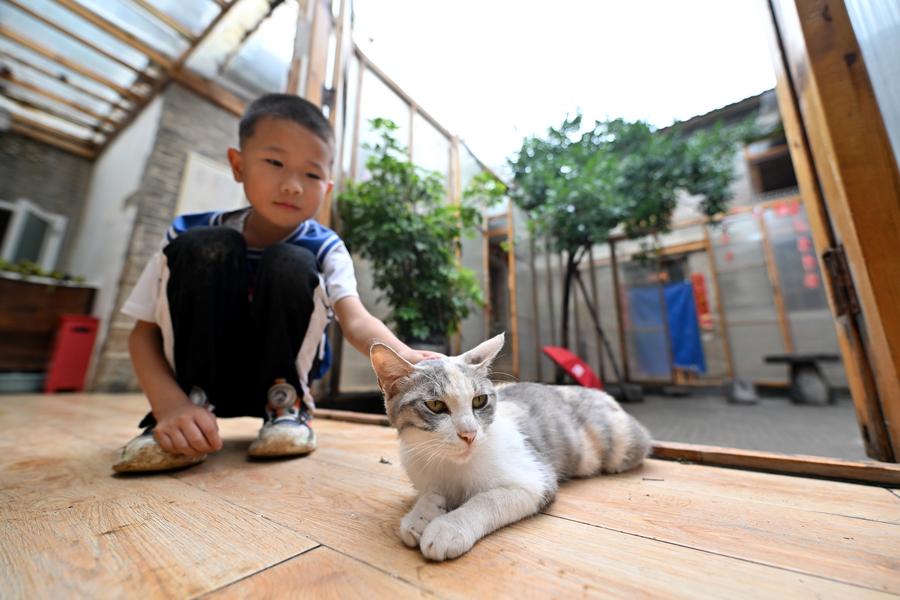
 0 Comment(s)
0 Comment(s) Print
Print E-mail Xinhua, April 14, 2025
E-mail Xinhua, April 14, 2025

A boy interacts with a cat at Wei Meiling's homestay in Langshuyuan Village, Changzhi City of north China's Shanxi Province, July 25, 2024. [Photo/Xinhua]
Once centered on basic companionship and security, pet ownership in China has transformed into a thriving and fast-evolving industry.
From the growing variety of pets to booming pet services like grooming, boarding and training, along with more pet-inclusive public spaces, China's pet economy is rapidly expanding. Behind this momentum are both the increasing emotional needs of pet owners and the continuous wave of innovation shaping the pet-related market.
Pet choices beyond cats, dogs
While cats and dogs remain the most popular animals in Chinese households, exotic pets are steadily gaining popularity.
In Shanghai in east China, a once niche pet store has become a magnet for enthusiasts of less conventional animal companions -- such as snakes, lizards, raccoons and spiders. Starting out as a modest reptile shop in 2016, it has since expanded into a 160-square-meter venue that lets visitors interact closely with a diverse mix of exotic animals.
Indeed, the 2025 China Pet Industry White Paper reveals that there was a steady exotic pet ownership trend in the country in 2024.
According to the white paper, approximately 17.07 million people in China are keeping exotic pets -- with a market size nearing 10 billion yuan (about 1.39 billion U.S. dollars).
These less common pets are clearly gaining popularity, especially among young people in China, and are starting to dilute the traditional dominance of the pet market by cats and dogs, said the owner of the Shanghai store Cui Dejun.
Rise of refined, personalized pet care
As living standards improve in China, people's views on pets are also changing. No longer just protectors or casual companions, pets are now treated like family members. This shift is driving a move from basic care to higher-quality, more personalized spending on their daily needs.
According to the Asia Pet Research Institute, China was home to 187 million pet dogs and cats in 2024 -- while the value of its pet market exceeded 300 billion yuan.
Another white paper, this one focusing on pet fashion trends, shows that between 2018 and 2023, the pet supplies market had grown at a compound annual rate of 13.6 percent. Adults aged 25 to 34 accounted for 61.7 percent of pet owners, with much of their spending driven by emotional attachment to their pets.
Pet owner Ms. Li, for example, spends more than 1,000 yuan monthly on her dachshund, including tailored supplements to address breed-specific health concerns. Online platforms such as Taobao report dramatic year-on-year growth in supplement sales. Notably, sales of freeze-dried supplements increased eightfold, fish oil sales were up ninefold, while lactoferrin sales saw a twelvefold surge.
This trend extends to services as well. Ms. Mao, a pet owner from the post-90s generation, spends thousands of yuan each month on professional training to enhance her dog's behavior and socialization. Meanwhile, Zhu Han, a post-2000s cat owner, hires in-home pet-sitting services and installs a smart camera to keep track of her cat's activities in real time while she's traveling.
"The pet fashion industry has moved far beyond clothing," said Zhang Xin, director of the recently concluded 2025 Shanghai Pet Fashion Week, which revealed yet another trend. "Collars, shoes, backpacks and smart wearables -- a full ecosystem is taking shape."
China's pet-friendlier public spaces
With pet ownership rising, cities across China are adapting. More than 100 pet-friendly shopping malls have been established nationwide. Restaurants, hotels and parks are increasingly welcoming animals.
In Shanghai alone, over 40 parks offer pet-designated activity zones, exemplifying the growing trend toward "pet-human co-living."
As more travelers travel with their pets, many owners are calling for easier and more pet-friendly transport options by rail and air. In response, China's transport sector is upgrading its services.
Since last week, ten high-speed trains connecting major stations including Beijing South, Jinan West, Nanjing South, Shanghai Hongqiao and Hangzhou East Railway Station, have launched pilot pet transport services.
Meanwhile, China Southern Airlines launched a "Pets in Cabin" option during the Spring Festival travel rush this year. Passengers can now buy a special seat for their pets -- allowing them to travel together in the cabin.
Keeping pets has become a basic need and a lifestyle trend in China. Demand for companionship is rising, especially among seniors over 60 and younger generations born after 1990. For many, pets provide emotional comfort, help relieve stress and have become an important part of their everyday lives, said Wang Jinquan, an expert at the Institute of Feed Research of Chinese Academy of Agricultural Sciences.